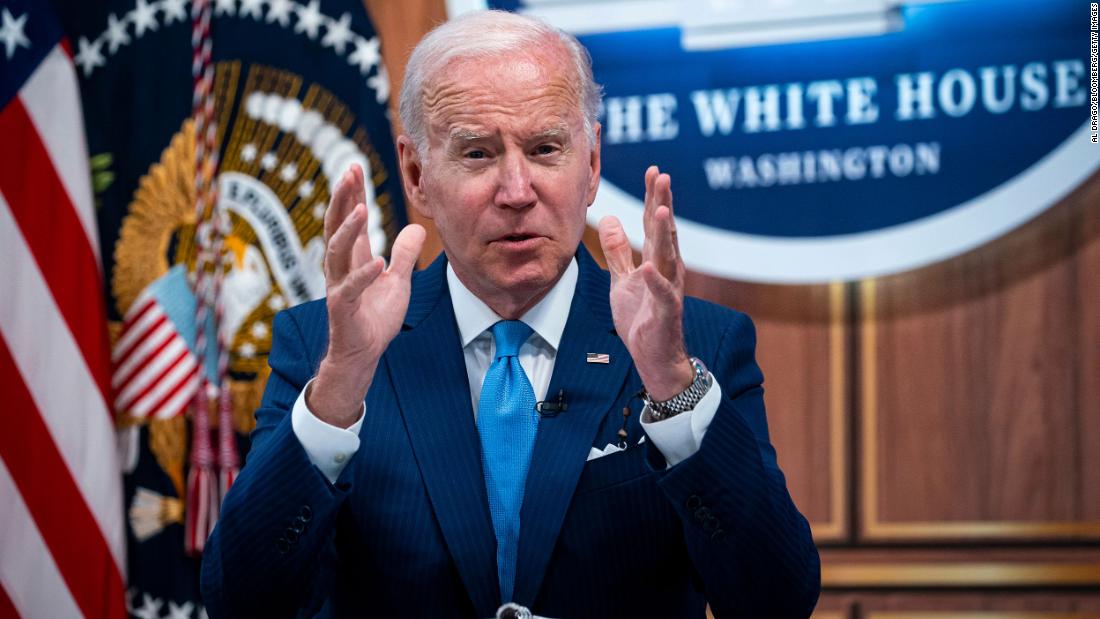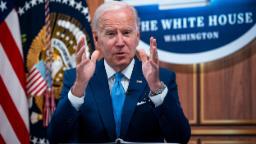

Biden is bolstering perceptions that his crisis-submerged presidency is beleaguered and gave Republicans a vast opening Wednesday with several eye-opening statements about challenges weighing down his White House.
But most fundamentally, the President’s protests that he can’t quickly solve the problems facing the country conflict with his own theory of his administration, which he laid out during his first official news conference in the White House last year.
Back in March 2021, the President said: “When I took office, I decided that — it was a fairly basic, simple proposition, and that is I got elected to solve problems.”
Biden’s record for competence is fraying
All presidents face unforeseen challenges and Biden’s administration has been beset by simultaneous crises that dwarf those his recent predecessors have confronted. Commanders in chief often learn, to their frustration, that their position is, by constitutional design, far from all powerful and that political conditions and opponents and even supposed friends in Congress can clip their wings.
But the President’s apparently growing frustration is hardly selling the image of a dynamic White House team setting about the nation’s problems and is unlikely to project confidence to the voters who have soured on him since 2020.
“If inflation is at 8% in November, we are going to lose a lot of seats,” James Carville, the political strategist behind President Bill Clinton’s 1992 election victory, told CNN’s Erin Burnett on Wednesday about Democrats’ prospects.
Congress bucks Biden’s authority
The administration’s troubles on Capitol Hill have also underscored the impression of a foundering presidency.
Many Democrats are dismayed at Biden’s failure to pass his sweeping climate and social spending agenda, which collapsed from the opposition of moderate Sens. Joe Manchin of West Virginia and Kyrsten Sinema of Arizona. Repeated efforts to get that pair to climb down, partly to appease the ambitions of progressives in the House, only added to the perception of a power-starved White House.
Suggestions that Biden is a spectator as his own presidency loses momentum plays into GOP claims that he is out of his depth and has lost a step ahead of November’s elections, which could cost Democrats control of the Senate and the House.
One rapid response email from the Republican National Committee portrayed Biden as “bored and bungling” — previewing likely attacks on the President by the GOP’s candidates as campaign season heats up.
Inflation haunts the White House
The President undercut the image of an engaged White House focused on inflation when he admitted on Wednesday there wasn’t much he could do.
“There’s a lot going on right now but the idea we’re going to be able to click a switch, bring down the cost of gasoline, is not likely in the near term. Nor is it with regard to food,” Biden said at the White House.
“We can’t take immediate action that I’m aware of yet to figure out how we’re bringing down the prices of gasoline back to $3 a gallon. And we can’t do that immediately with regard to food prices either,” the President added.
The administration has repeatedly pointed out that inflation has been spiked by supply chain bottlenecks resulting in high demand and a shortage of goods after the pandemic. Other outside factors include new lockdowns in Chinese manufacturing bases because of the country’s failure to stem Covid-19. The Russian invasion of Ukraine has sent already high energy prices even higher. The President’s release of millions of barrels of oil from strategic reserves hasn’t brought gas prices down.
Biden challenged Donald Trump’s presidency of lies and chaos by telling Americans he would always be straight with them. But his current candor is unlikely to ease his perilous political plight. The White House’s reputation for competence hasn’t been helped by its insistence last year that inflation was likely to be “transitory.” Biden’s plans to address inflation include getting out of the way of the Federal Reserve as it raises interest rates and passing clean energy tax credits — a plan that could help ease financial pressures for some families but that also requires the President to unblock the obstacles in Congress that have stalled his domestic spending plans.
In the meantime, an economy that is generally doing well, with unemployment near 50-year lows, is being overshadowed by high prices for basic goods and at gas — a potential disaster for Democrats.
New questions over handling of baby formula crisis
The White House’s reputation for competence and problem solving is also taking a hit over the spectacle of empty baby formula shelves. The administration has said that it has been actively working on the situation — caused by the shutdown of an Abbott factory over contaminated formula — since February.
Yet Biden insisted on Wednesday that he didn’t learn about it until much later. “Here’s the deal, I became aware of this problem sometime in early April, about how intense it was. And so we did everything in our power from that point on,” Biden said during a meeting with formula manufacturers.
His comment not only raised questions about the earlier stages of the administration response, which has now escalated to such an extent that the President has used wartime powers to try to end the shortage and emergency flights to bring supplies from abroad. It also unleashed a flurry of questions as to why the President was not informed about the situation if his team had been working on it — an issue that gets to the core of perceptions of an administrative failure.
White House press secretary Karine Jean-Pierre struggled to square Biden’s comments with earlier White House statements and insisted that agencies like the US Food and Drug Administration and the US Department of Agriculture had been hard at work on the issue for months. At one point, Jean-Pierre seemed to suggest that the crush of challenges facing Biden might have been to blame for him not hearing about the baby formula issue until April.
“I mean, the President has multiple issues crises at the moment,” Jean-Pierre said. “When he walked into the administration, he talked about the multiple crises that we needed to deal with as a country.”